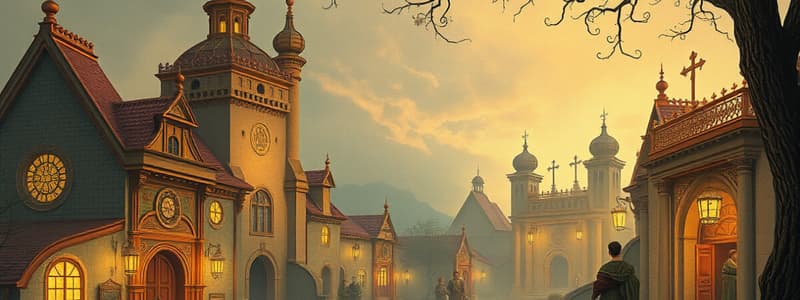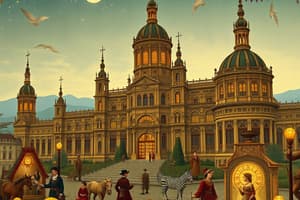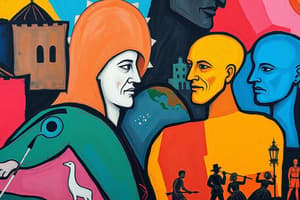Podcast
Questions and Answers
What is the primary focus of social history?
What is the primary focus of social history?
- Analysis of government systems
- Examination of economic systems
- Interpretation of historical documents
- Study of everyday life and cultural practices (correct)
Which event marked the transition from ancient to medieval Europe?
Which event marked the transition from ancient to medieval Europe?
- Columbus' Voyage
- American Revolution
- Fall of Rome (correct)
- World War I
Which of the following civilizations did NOT play a major role in ancient history?
Which of the following civilizations did NOT play a major role in ancient history?
- China
- Greece
- Mesopotamia
- France (correct)
What era is characterized by the absence of written records?
What era is characterized by the absence of written records?
Which significant event initiated European exploration of the Americas?
Which significant event initiated European exploration of the Americas?
Which historical methodology utilizes original documents and artifacts?
Which historical methodology utilizes original documents and artifacts?
Which period is associated with feudalism and the rise of kingdoms?
Which period is associated with feudalism and the rise of kingdoms?
Who was the leader of the Indian independence movement known for non-violent techniques?
Who was the leader of the Indian independence movement known for non-violent techniques?
Flashcards are hidden until you start studying
Study Notes
Key Concepts in History
-
Definition of History
- The study of past events, societies, and cultures.
- Involves the analysis of records, artifacts, and narratives.
-
Importance of History
- Helps understand human behavior and societal development.
- Provides context for current events and issues.
- Influences identity and cultural heritage.
Major Periods in History
-
Prehistoric Era
- Time before written records.
- Includes Stone Age, Bronze Age, and Iron Age.
- Significance of archaeological findings.
-
Ancient History
- Focus on civilizations like Mesopotamia, Egypt, Greece, and Rome.
- Development of writing, trade, and governance.
- Influence of mythology and religion.
-
Medieval History
- Spanning roughly from the 5th to the late 15th century.
- Feudalism, the rise of kingdoms, and the Church's influence.
- The Crusades and the Black Death as key events.
-
Modern History
- From the late 15th century to the present.
- Renaissance, Enlightenment, and Industrial Revolution.
- Significant global conflicts (World Wars, Cold War).
Methodologies in History
-
Primary Sources
- Original documents (letters, diaries, government records).
- Artifacts (tools, clothing, architecture).
-
Secondary Sources
- Interpretations and analyses (books, articles).
- Historiography: study of how history has been written.
Historical Themes
-
Social History
- Focus on everyday life, social structures, and cultural practices.
-
Political History
- Examination of governments, political movements, and revolutions.
-
Economic History
- Study of economic systems, trade, and industry development.
-
Cultural History
- Analysis of art, literature, and intellectual movements.
Significant Historical Events
-
Fall of Rome (476 AD)
- Marked the transition from ancient to medieval Europe.
-
Columbus' Voyage (1492)
- Initiated European exploration and colonization of the Americas.
-
American Revolution (1775-1783)
- Established the United States and influenced democracy.
-
World Wars (1914-1918, 1939-1945)
- Major global conflicts with lasting impacts on nations and politics.
Historical Figures
-
Cleopatra
- Last active pharaoh of Ancient Egypt, known for her political acumen.
-
Julius Caesar
- Roman general and statesman, pivotal in the transition from Republic to Empire.
-
Mahatma Gandhi
- Leader of Indian independence movement through non-violent civil disobedience.
-
Nelson Mandela
- Anti-apartheid revolutionary and first black president of South Africa.
Conclusion
- History is a dynamic field that helps us understand the complexities of human experience.
- Studying history involves examining various perspectives and sources to gain a comprehensive view of the past.
Key Concepts in History
- History studies past events, societies, and cultures, using records, artifacts, and narratives.
- Understanding history is crucial for grasping human behavior and societal evolution, providing context for contemporary issues and influencing identity and cultural heritage.
Major Periods in History
- Prehistoric Era encompasses the Stone Age, Bronze Age, and Iron Age, characterized by the absence of written records and significant archaeological discoveries.
- Ancient History highlights major civilizations like Mesopotamia, Egypt, Greece, and Rome, marking advancements in writing, governance, and trade, alongside the profound impact of mythology and religion.
- Medieval History spans from the 5th to late 15th century, featuring feudalism, the rise of kingdoms, and the Church's dominance, with critical events such as the Crusades and Black Death.
- Modern History extends from the late 15th century to the present, covering transformative periods like the Renaissance, Enlightenment, and Industrial Revolution, alongside significant global conflicts including the World Wars and the Cold War.
Methodologies in History
- Primary Sources include original documents like letters, diaries, and government records, as well as artifacts such as tools and architecture.
- Secondary Sources comprise interpretations and analyses found in books and articles, along with historiography, which examines the evolution of historical writing.
Historical Themes
- Social History focuses on everyday life, social structures, and cultural practices.
- Political History involves the study of governments, political movements, and revolutions.
- Economic History examines economic systems, trade practices, and industrial development.
- Cultural History analyzes art, literature, and intellectual movements over time.
Significant Historical Events
- Fall of Rome (476 AD) signifies the shift from ancient to medieval Europe, impacting development across the continent.
- Columbus' Voyage (1492) marked the beginning of European exploration and colonization efforts in the Americas.
- American Revolution (1775-1783) led to the establishment of the United States, profoundly influencing democratic ideals worldwide.
- World Wars (1914-1918, 1939-1945) were major global conflicts that reshaped nations and altered political landscapes.
Historical Figures
- Cleopatra, the last active pharaoh of Ancient Egypt, is noted for her political skills and alliances.
- Julius Caesar, a pivotal Roman general, played a crucial role in transitioning Rome from Republic to Empire.
- Mahatma Gandhi spearheaded the Indian independence movement, advocating for non-violent civil disobedience.
- Nelson Mandela was an anti-apartheid revolutionary who became the first black president of South Africa, symbolizing resilience in the fight for equality.
Conclusion
- The exploration of history is an evolving field that enhances our understanding of complex human experiences, requiring the examination of diverse perspectives and sources for a well-rounded view of the past.
Studying That Suits You
Use AI to generate personalized quizzes and flashcards to suit your learning preferences.




